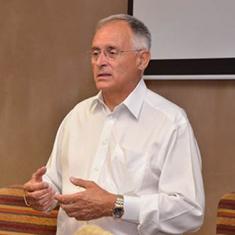How HEIs can aid local and regional development - Chris Shepherd at Unisa
It was lovely to host Chris at Unisa the past week. Herewith an article* on his lecture published on Unisa’s Internal Newsletter today.
Chris, thanks again for an excellent lecture. Your own local experience and success have added tremendous value to this discourse.
Kind regards
Sunette
 Unisa hosted Chris Shepherd, the Vice-Chair of PASCAL International Observatory, who has had a distinguished career in bridging the gap between local government, consultancies and the academic world.
Unisa hosted Chris Shepherd, the Vice-Chair of PASCAL International Observatory, who has had a distinguished career in bridging the gap between local government, consultancies and the academic world.
Delivering a public lecture on a global perspective on youth unemployment and small and medium (SME) enterprises development, Shepherd said the current issues worldwide are the economic recession, unemployment, sluggish regional development, environmental challenges, and illusive sustainability. He said there is also overwhelming evidence that poorly trained and unskilled people will not find worthwhile employment, and that this scenario is not unique to South Africa and Africa, as governments in Europe, the US and Australia currently face common issues.
Instead of a top-down approach, Shepherd’s lecture provided a bottom-up approach to addressing these issues providing possible solutions for local and regional problems with only a passing reference to national policies and interventions. He said because employment and economic growth are inextricably linked to local and regional development, higher education had a crucial role to play in achieving this.
Economic growth and growth in employment are more likely to come from an expansion in SME activity in a climate that is supportive. There are some initiatives from regional governments, universities, industry and voluntary organisations that could support this growth.
Drawing from global examples, Shepherd said these initiatives could include business link partnerships as done in the UK and France, local strategic and enterprise partnerships as in the UK, science incubators found in the US, UK and France, New leaf SME support and brokerage in Scotland, Chambers of Commerce export support found in France and the UK, the Princes’ Trust in the UK and Commonwealth, new apprenticeships as done in Germany, Sweden and the UK, universities for business in the US and UK, as well as funding and credit unions as done in Australia.
Essential for regional development is lifelong learning, good infrastructure, business development, employment opportunities, pure and applied research, and valuing culture and heritage. In terms of employment opportunities, he said job matching to ensure people are fit for the job, paying a living wage to ensure job retention, and workforce development to match skills with changing needs, was crucial.
On the importance of research, Shepherd said original research (new ideas and products), applied research to support existing businesses in product development, and research to drive expansion and open new markets was necessary. Learning organisations, he said, should promote development and expansion, ensure individuals grow in skills and confidence, and provide them with life skills to adapt to a changing world. He added that it was important for higher education institutions to have relationships with primary and high schools, and to offer short-cycle courses instead of lengthy qualifications. “These institutions can also play a crucial role in preparing entrepreneurs before they set up their businesses, pointing out the possible pitfalls, and once the business is up and running, offer a mentoring service through its business school or a dedicated arm of the university.”
In bridging the gap between academia, the public sector, civil society, and government to ensure local and regional development of a particular area, Shepherd said higher education institutions could be at the forefront of the change, by finding a champion for the cause, someone such as a sports or entertainment personality, and by leading conversations with all stakeholders to identify the objectives and devise a plan of action before approaching funders.
* Article by Rivonia Naidu-Hoffmeester and Yonela Zidlele
Prof Sunette Pienaar
Deputy Director: Community Engagement and Outreach, Unisa
Director: PASCAL International Observatory
 Printer-friendly version
Printer-friendly version- Sunette Pienaar's blog
- Login to post comments
- 135 reads




